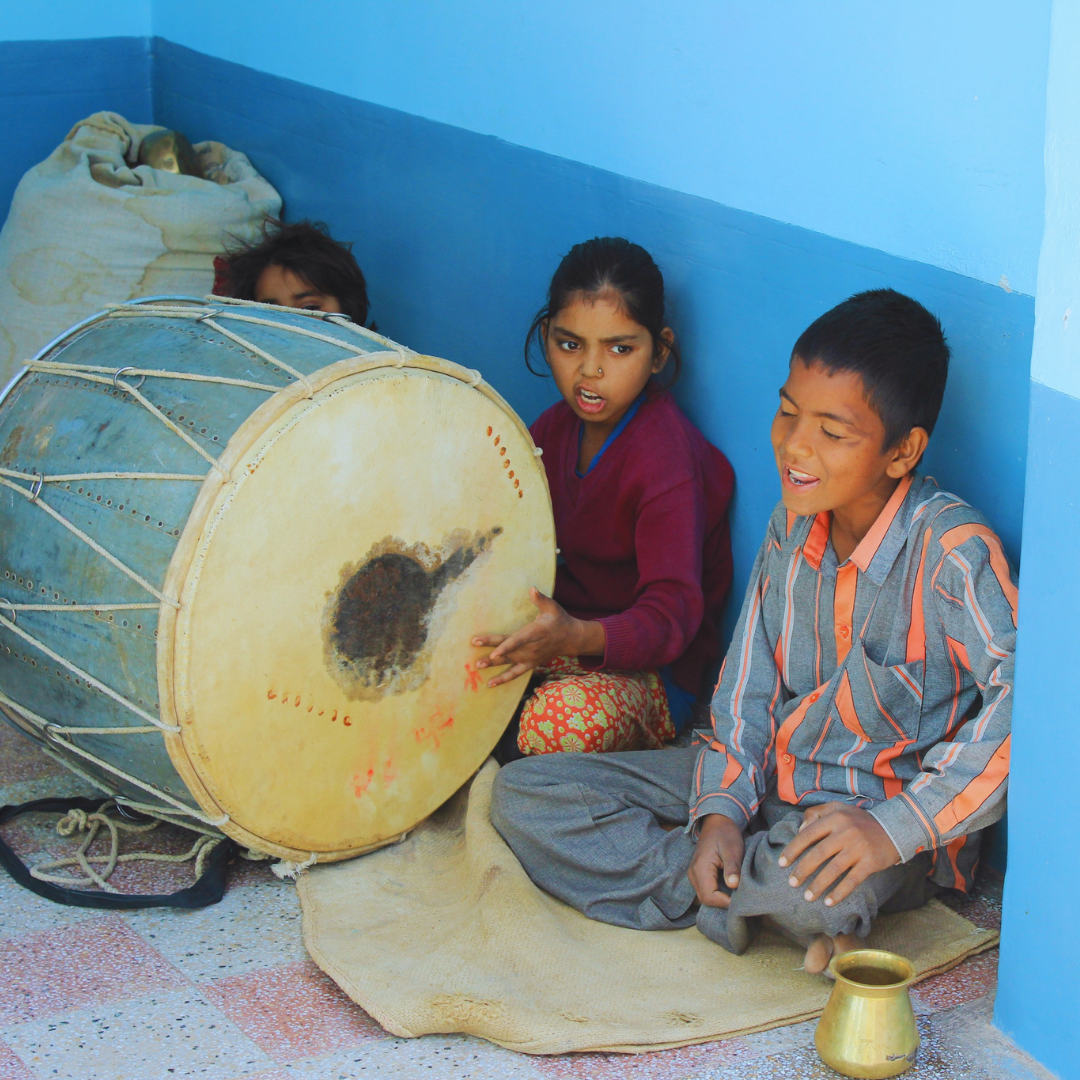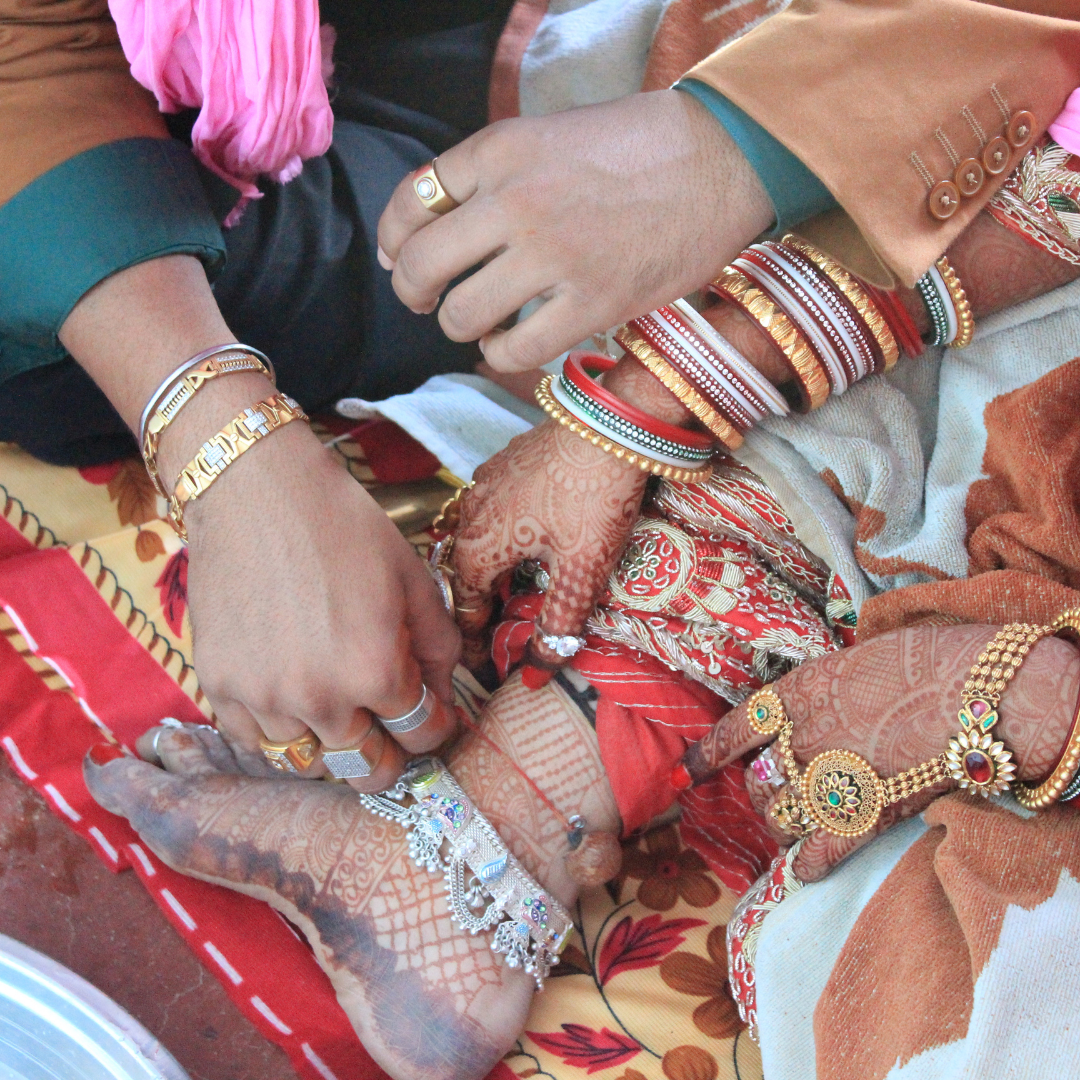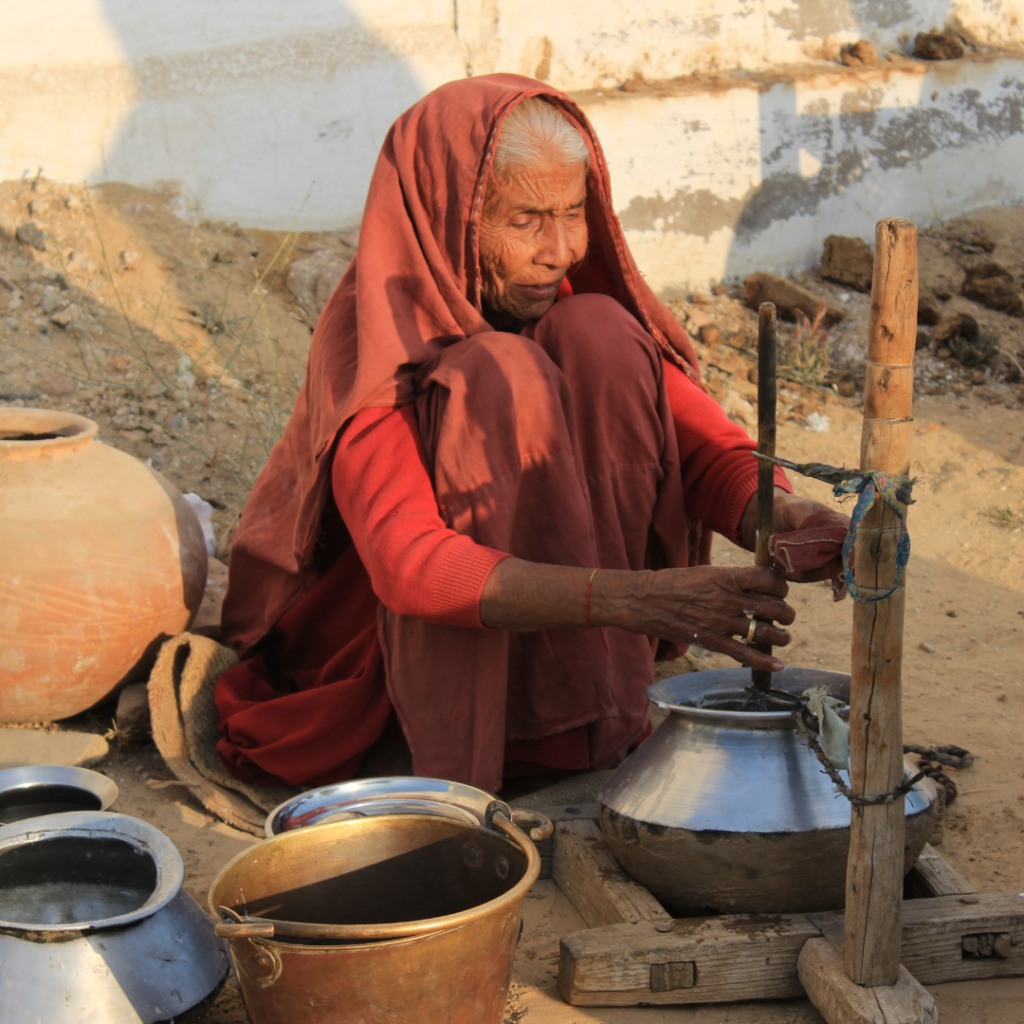If history is the study of 'past' time, then the colonial period can definitely be a historical one in the present context. Contemporary study of history puts a lot of onus on creating methodological interventions in studying history. Considering this, something as unscholarly and mundane as folk songs can amount for historical data. In the area of folk songs, we find several examples of representations of the British (Boratti 345). This paper studies colonial imagery in Rajasthani folk songs as an alternative site of history reading. As Nandita Prasad Sahai argues in her book, history writing has often been an elite enterprise, the oriental history has often been the history of the colonized elite by the colonizers (11). This paper offers a counter source of history writing, where the composer and the subject are the 'other'. It thus disrupts and deconstructs established norms of knowledge creation and dissemination.
This paper would look at representative Rajasthani folk songs and trace and interpret colonial imagery in these songs and thereby subvert Eurocentric ideas of what constitutes history.
Of Raj and Swaraj: Let's look at the following lines from a representative Rajasthani folk song making references to the schools and colleges of the raj, the naukaris of the raj.
The to panch baras ra bana hoi gya
The to doodh re patasa bana piyo sa
Ey hoji re bana re mahra the naval bana
Haai jodi ra bana re
Bana das re baras ra hoi gya
The to raj ri iskoola mey padgya
Ey hoji re bana re mahra the naval bana
Haai jodi ra bana re
Bees barso re maai hoya sa
The to raj ri naukari bana raya sa
Ey hoji re bana re mahra the naval bana
Haai jodi ra bana re
You have turned five bridegroom
You have milk-patasa1
Oh my beloved bridegroom
My companion bridegroom
Bridegroom, when you turned a ten
You went to a Raj school
Oh my beloved bridegroom
My companion bridegroom
When you turned a twenty
You employed yourself with a Raj job bridegroom
Oh my beloved bridegroom
My companion bridegroom
(Transliteration and translation by the author)
The second and third stanzas mean that when the bridegroom turns ten, he attends a school of the raj, then he turns a twenty and that is when he gets a raj job.
twenty and that is when he gets a raj job.
The progress of the bridegroom from a milk-drinking kid to a raj employee is not a mean feat. The bride is very proud of this achievement of her husband.
The honour associated with English education has been celebrated in many Rajasthani folk songs. What puts these songs in the colonial category is the fact that it was the British who first interlinked the idea of an English education with jobs in the Indian context.
The following song again refers to the association between education and a government job.
E padhbo hi seekho Dhola, likhno hi seekho;
Padhiya paachhe naukardi the karjyo mhaara Baalamji.
Laadooda to bantulee.
E padhno hi seekhaan gori, likhno he seekhaan,
Padhiya paachhe naukri mhe karsyaan mirganaini e;
Kahna thaaro maanalan.
Dhola (beloved), do learn to read, do learn to write
After learning, do take up a job, my dearest;
I will distribute sweets to all (to convey my happiness).
Yes, fair lady, I will learn to read, and I will learn to write
After learning, I will take up job, Doe-eyed Beloved,
I shall indeed listen to you!
(Translation and transliteration by Mukherjee and Patodia 20-21)
Look at the following song which not only celebrates the husband's English education but also underscores the role of the woman in the husband's academic achievements.
nathari ji bech kitaba lyaua
ja bethya askulya men
hindi ji parh angreji pargya
rela ra babu bangya ji
dhabja ye hachki dhabja re jivara
bar malu mari gauri su
man sukhi maro bap sukhi
gauri dukhi rang mahala men
Sold my nose ring and brought books
Went and sat in the school,
Studied fine Hindi, and studied English,
Became a respected railway clerk.
Oh stifle my hiccups and stifle my soul!
"Just now I'll meet with my pretty one."
Mother is happy, my father is happy,
but in the bedchamber, pretty one's sad.
(Translation and transliteration by Gold 17-18)
Gandhi and the charkha are other prominent images from colonial India which find a mention in Rajasthani folk songs. Gandhi's leanings towards a caste-less society and independent charka-spinning women found echoes in many Rajasthani folk songs. Look at the following two Rajasthani folk songs.
Hasti to lyaajo kajali des ra ji bana
Ghudla lyaajo ji, shahar Gandhiji aaya.
Jakadia Street main sabha banaai
Sab dunia dekhan kun aai.
Shahar Gandhiji aaya
Ghar ghar charkho lyaaya
Bring in the elephants from the lands of 'kajali'
Bring in the horses; Gandhiji has arrived in our city.
He has called for a meeting at Jakaria Street,
The world has gathered there to see him.
Gandhiji had come to our city
He brings a charkha to every home.
(Transliteration and translation by Mukherjee and Patodia 53)
The next song makes explicit a woman's desire to be with her husband. She doesn't mind doing extra work if that could keep the husband near her. But the husband cites his own reasons for not taking up the offer. Another thing that comes to mind when one reads this song is the positive intervention that Gandhiji's idea of women spinning charkhas brought to the long history of the association between Indian rural women and technology. Madhu Kishwar, in her introduction to a collection of articles from the first five years of Manushi states that rural Indian women were systematically kept away from the most basic technical equipment to perpetuate their subjugation by men and the rich and powerful (Kishwar, 20). The following song surely reflects the way the charkha empowered Indian women.
 O ji o mhaari jodi ra bhartaar
O ji o mhaari jodi ra bhartaar
Takvo to le lyun ji bijalsar ka ji
Pooni manga lyun ji Bikaner ka ji…
…mhe kaatun the binaj lyo ji…
…ab ghar aao…
…mhe chhaan beta sahukaar ra ji
E ji mhaari ghani e pyaari naar
Gori ri kamai syun poora na pade ji…
Dearest husband let me get a nice charkha (spinning wheel);
I will get the spindles for it from Bikaner,
I shall then spin a yarn and you can sell it and make a business out of it.
Please come back home…
…My dearest wife, don't forget that I am son of a sahukaar family.
It is an insult for me to live off my wife's earnings…
(Translation and transliteration by Mukherjee and Patodia 95)
Roaring Rails and Running Roads: The British brought varied modern means of transportation to India. The following excerpt from a Rajasthani folk song makes a mention of the railway engine. The railways were a major symbol of modernity in the colonial context.
Anjan ki seeti me mhaaro mann dole
Chala chala re dilaiver gaadi haule haule
Dungar bhaage, nandi bhaage aur bhaage khet
Tanda ki to toli bhaage, ude ret hi ret
Jaipur se jab chaali gaadi mein baithi thi soodhi
Aisi jor ko dhakko laagyo jad mein pad gayi aundhi
Badi jor se chaale Anjan deve jor ki seeti
Dabba dabba ghoom rahyo topi vaaro TT
I hear the whistle of the engine and my heart surges in delight.
O engine driver, slowly, slowly run the train!
(It seems) the hills and the rivers and farms too are running.
The tandas too are running, raising clouds of dust!
When the train started from Jaipur, I was sitting up straight
But then the train gave such a jerk that I stumbled and fell.
The train runs so fast, and the engine's whistle is so so loud.
And look, a TT wearing a big hat roams from one bogie to the other.
(Transliteration and translation by Mukherjee and Patodia 1)
Rajasthan, a blend of vast sandy terrains and mountainous surfaces has always valued its roads. Road projects also offer work opportunities to the locals. Most of these labourers would sing to dilute the hardships of the exercise. The following song makes a mention to one such road-construction project. It gives a romantic angle to the whole drudgery. The song takes a humorous take on the whole exercise and declares it a private project for personal joys. This is the strength of folk songs. They inspire people to laugh away their concerns and make light of the mundane and tedious.
Kankari ralav e maa mhaaro parnodyo
Koi sadak bandhaave mhaaro jeth,
Bhabhiji ke chalba ne…
Dear mother, my husband pours in the concrete,
My brother-in-law gets the road constructed
For my sister-in-law to walk on.
(Translation and transliteration by Mukherjee and Patodia 52)
One can see how the song doesn't glorify these inventions on a grand scale, infact, it celebrates the little joys these have brought to their mundane lives.
Riding Hope and Bicycles: The recruitment of locals by the British army offered temporary hopes to the poor and unemployed and brought indefinite periods of separation for the women. The following song makes a direct reference to her husband joining the 'paltan' (army) and the sorrow awaiting them. The song also makes a mention of a wrist-watch, another modern commodity, to lure the beloved.
mari sagi nanand ra vira ra palatan men bharti hogya
jata ro pakaryo godo man ekalari mat chhoro
jata ro pakaryo pucho man mail chunadyo uncho
piya mail kadya hi na charhti niche hi phalka poti
jata ri pakri anguli manai ek gharadyo bagari
jata ri pakri dhogati manai lajyo samadar moti
andherya ghar men soti mari lar motya vali tuti
mat lar ra sayaba masyu, mara lekh likhyora thasyu
mar mathra karab ko bharo, mar sasur nanand ro saro
gauri abki chhuttya me ghar aula
thar sir vali rakhati lyaula
rakhari na patthar se phoru, me gin gin dinara toru
gauri abki chhuttya me ghar aula
thar har gala ko lyaula
thar hatha ri ghariya lyaula
har na ji patthar se phoru me gin gin dinara toru
ghariya ji patthar se phoru me gin gin dinara toru
My special sister-in-law's brother joined the army.
As he went I grabbed his knees, "Don't leave me alone!"
As he went I grabbed his wrist, "Have built for me a palace tall!
Darling, I never climb up to the palace, below I roll out bread."
As he went I grabbed his finger, "Have forged for me a silver bracelet."
As he went I grabbed his dhoti, "Bring for me some ocean pearls."
While sleeping in the dark house, my pearl necklace broke…
Don't argue with me, Husband, my fate is written with you. On my head's a load of
fodder, my mother-in-law and sister-in-law have all the power."
"Pretty one, now I'll come home on vacation, and I'll bring an ornament for your forehead."
"I'll smash the ornament with a stone, I'll count and curse the days."
"Pretty one, now I'll come home on vacation, and
I'll bring a necklace for your neck,
I'll bring a wrist watch for your hand."
"I'll smash the necklace with the stone, I'll count and curse the days.
I'll smash the wrist watch with a stone, I'll count and curse the days."
(Translation and transliteration by Gold 16-17)
The following song also makes references to a variety of modern terms like a wrist-watch, sari, buckle, cooler, fan and a bicycle.
saikal baitho, ye gauri; saikal baitho, ye gauri
saikal baitha to chakkar ava, ra piya; chakkar ava, ji piya
chakkar ava to paidal ghumo, ye gauri; paidal ghumo, ye gauri
paidal ghuma to kankar gadgya, ji piya; kankar gadgya, ji piya
kankar gadgya to chappal lyadyu, ye gauri; chappal lyadyu, ye gauri
chappal lyao to dupato lag, ji piya; dupato lag, ji piya
dupato lag to kapara dhaulyo, ye gauri; kapara dhaulyo, ye gauri,
kapara dhauva to sardi lag, ji piya; sardi lag, ji piya
sardi lag to pardo rakho, ye gauri; pardo rakho, ye gauri
pardo rakha to garmi lag, ji piya; garmi lag, ji piya
garmi lag to kular lyadyu, ye gauri; pankho lyadyu, ye gauri
pankho lyadyo to choti bagar, ji piya; choti bagar, ji piya
choti bagar to bakal lyadyu, ye gauri; bakal lyadyu ye gauri,
bakal lyao to sari phat, ji piya; sari phat, ji piya
sari phat to than kai matlab, ye gauri; than kai matlab, ye gauri?
Sit on my bicycle, pretty woman; sit on my bicycle, pretty woman.
On your bicycle I'll get dizzy, darling, get dizzy, darling.
If you get dizzy we'll stroll on foot, pretty woman; stroll on foot, pretty woman.
Strolling on foot I'll step on pebbles, darling; step on pebbles, darling.
If you step on pebbles I'll bring you sandals, pretty woman; bring you sandals, pretty woman.
If you bring sandals I might hurt my shawl, darling; hurt my shawl, darling.
If you hurt your shawl then wash your clothes, pretty woman; wash your clothes, pretty woman.
If I wash my clothes then I'll get cold, darling; get cold, darling.
If you get cold then cover up, pretty woman; cover up pretty woman.
Covered up I'll get hot, darling; get hot, darling.
If you get hot I'll bring a cooler, pretty woman; I'll bring a fan, pretty woman.
A fan will muss my braid, darling; muss my braid, darling.
If your braid gets mussed I'll bring a barrette, pretty woman; a barrette, pretty woman.
A barrette could tear my sari, darling; tear my sari, darling.
If your sari tears what's it matter to you, pretty woman? What's it matter to you, pretty
woman?
(Translation and transliteration by Gold 18-19)
The Gora-Kala Dichotomy: All the above songs made references either to 'modern' entities or changes introduced by the British in India. The following songs make a very direct and bold reference to the British presence in Rajasthan. Auwa was a very important historical site for the 1857 friction in Rajasthan. The 1857 Uprising took a very different form from the very popular view of it being a neat war between the Whites and the Indians/Blacks. In Auwa, there were three forces: the British, the local king and the local heads or thakurs. The king in Auwa sided with the British and the locals did not like this. They joined forces with the local heads like Khushal Singh and Ratan Rana. The following song makes a direct reference to 1857 events in Auwa. There’s a play on the term ‘kala’ in this song since the locals are black-skinned and the enemy, the Whites are black-capped.
Vaniya wali gochar maain, kalo log padiya o
Rajaji re bhele to, phirangi ladiyo o kali topi ro
Hain o kali topi ro phirangi failaav kidho o
Kali topi ro
Baarli topan ra gola, dhoodgadh main lage o
Maainli topan ra gola, tambu tode o
Jhalle Aauwo
Hain o jhalle Aauwo, Aauwo dharti ro thaambo o
Jhalle Aauwo
Maainli topaan to chute Aadaavlo dhuje o
Aauwa ra nath to Sugaali pujei o
Jhagdo aadariyo
Hain o jhagdo aadariyo, Aauwo jhagda ne baanko o
Jhagdo aadariyo
Rajaji ra ghodaliya kalan re laare dode o
Aauwe ra ghoda to pachadi tode o
Jhagdo aadariyo
Aauwa ri surajpol, mukni haathi ghume o
Jodhana ra kila main kameti dhuje o
Jhagde Aauwo
Hein o jhagdo hven do, jhagda main thaanri jeet vyehla o
Jhagdo hven do
Oh, our dark-skinned men have
pitched their tents in the Banya's
pasture lands;
Our Rajah, he is with the Whites,
and he is making war on us!
The White Firangis have Black caps on,
The black-capped whites are
fanning out on us!
The black-capped ones!
The shells from their guns
are hitting only the dust,
But oh, our guns are smashing
their camps!
This is glorious Auwa!
Oh you glorious Auwa,—
Auwa, you are the pillar that
supports this land!
Oh, when our guns go off they
shake even the Aravalli hills!
The lord of Auwa is worshipping
the goddess Sugali;
Oh, the lord of Auwa is praying
to the goddess Sugali!
And Hurrah, the battle is on!
Auwa is a land of her warrior sons,
Hurrah, the battle is on!
Oh the Raja's cavalry are
pursuing their own dark countrymen,
But the horses of Auwa are
kicking them with their hind legs
Keep the fighting on
Let the battle go on,
Victory will be yours
Oh, keep the fighting on
Let the battle go on!
(Translation from Joshi 157-9, transliteration by the author)
The following song makes a very stark and unhappy reference to what the British presence did to all the aspects of local life in Rajasthan. The song is a sort of a premonition about the long lasting impact of the British presence in India. It sees beyond the military loss and enumerates the unfathomable loss of the essentials of existence.
Ghoda rove ghaas ne, taabaria teenge roti ne
Burjan mein thukranya rove jaaman jaaya ne
Ke rolo vapariyo
Des mein angrej aayo re, rolo vapariyo
The horses are deprived of grass; the children crave for bread;
In their towers, women of royal bearings mourn their sons;
Why is there such turmoil?
The British have taken over my country; so this turmoil!
(Transliteration and translation by Mukherjee and Patodia 88)
Conclusion: All these examples prove that the folk is neither always archaic nor impossible to locate in time. Partha Chatterjee, in the introduction to History in the Vernacular says that most vernacular literatures are dismissed as non-modern (24). This paper even challenges this notion since it establishes folk songs, a non-modern entity, as a historical site by tracing the colonial, an epitome of modernity. It's thus a paradox where the subject of vernacular literature is the modern. Kirin Narayan too has supported this idea in her article where she says folk traditions could be influenced by the immediate world surrounding them (119). One can’t deny that an exact date of composition is not possible in the context of folk but a study of imagery can help us locate these songs in a tentative time frame, thus establishing histories as fluid categories. The postcolonial discourse has as one of its major contenders the idea of deconstructing history and thus disrupting the colonial metanarrative of a homogeneous and hegemonic history. Thus, these songs not only bring forward new materials for folklorists and for historians (Naithani 188); instead, they establish the idea of multiple regional and local histories.
Works Cited:
Boratti, Vijay. "The British in the Folklore of Colonial Karnataka". Folklore, vol. 125, no. 3, 2014, pp. 344-352. JSTOR, https://www.jstor.org/stable/43298082.
Champa & Meti. Banna Panch Baras R Ho Gaya. TDC Rajasthani, 2018, Accessed October 10, 2020. https://youtu.be/xtVtiS_CA5U
Chatterjee, Partha. "Introduction." History in the Vernacular, edited by Raziuddin Aquil and Partha Chatterjee, Permanent Black, 2012, pp. 14-39.
Gold, Anne Grodzins. “Khyal: Changing Yearnings in Rajasthani Women's Songs.” Manushi, vol. 95, no.5, July-August 1996, pp. 13–21.
Joshi, Puran Chand. 1857 In Folk Songs. Edited by Puran Chand Joshi, People's Publishing House, 1994.
Kishwar, Madhu. “Introduction.” In Search of Answers: Indian Women's Voices from Manushi, edited by Madhu Kishwar and Ruth Vanita, Zed Books Ltd., 1984, pp. 1–47.
Mukherjee, Nita, and Nandini Patodia. Voices from the Inner Courtyard: The Music of Rajasthan & the Life of Leela Somani. Shri Venkateshwar Somani Charitable Trust, 2012.
Naithani, Sadhana. "An Axis Jump: British Colonialism in the Oral Folk Narratives of Nineteenth-Century India." Folklore, vol. 112, no. 2, 2001, pp. 183-188. JSTOR, https://www.jstor.org/stable/1260831.
Narayan, Kirin. “Banana Republics and V.I. Degrees: Rethinking Indian Folklore in a Postcolonial World.” Asian Folklore Studies, vol. 52, no. 1, 1993, pp. 177–204. JSTOR, doi:doi.org/10.2307/1178456.
Sahai, Nandita Prasad. Politics of Patronage and Protest: The State, Society, and Artisans in Early Modern Rajasthan. Oxford University Press, 2006.
1 Patasa is a sort of a sugar candy, it is a sweet which has a cultural importance in the Rajasthani society

